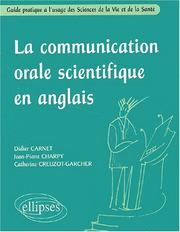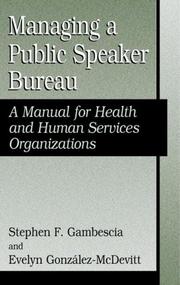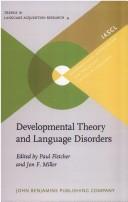| Listing 1 - 6 of 6 |
Sort by
|

ISBN: 9782729809447 2729809449 Year: 2005 Publisher: Paris: Ellipses,
Abstract | Keywords | Export | Availability | Bookmark
 Loading...
Loading...Choose an application
- Reference Manager
- EndNote
- RefWorks (Direct export to RefWorks)
Verbal Behavior --- Communication --- Terminology as Topic --- methods --- English --- Communicatie --- Medisch onderzoek --- Medisch en paramedisch onderwijs --- Recherche médicale --- Enseignement médical et paramédical --- Communication - methods --- Terminology as Topic - English

ISBN: 1135616094 1282322923 9786612322921 1410611957 9781410611956 0805848487 9781135616045 9781135616083 9781135616090 9780805848489 9781138003941 Year: 2005 Publisher: Mahwah, N.J. Lawrence Erlbaum Associates
Abstract | Keywords | Export | Availability | Bookmark
 Loading...
Loading...Choose an application
- Reference Manager
- EndNote
- RefWorks (Direct export to RefWorks)
The premise of this book is that individuals and societies have an inexorable urge to morally develop by challenging the assumptions of the previous generation in terms of what is right and wrong. The focus is on the nature and functional value of conflicts and challenges to the dominant moral and social values framework. Through this analysis, individuals develop moral character through conflict with their local authority figures, including parents. The moral structure of societies evolves through intergenerational challenges to and contradictions with the dominant social order. The b
Moral education --- Socialization --- Conflict (Psychology) in adolescence --- Interaction analysis in education. --- Child socialization --- Children --- Enculturation --- Social education --- Education --- Sociology --- Analysis, Interaction (Education) --- Interaction process analysis in education --- Teacher-pupil interaction --- Observation (Educational method) --- Social interaction --- Teacher-student relationships --- Verbal behavior --- Adolescent psychology

ISBN: 1280413360 9786610413362 0387242538 0387242511 9780387242514 9781280413360 9780387242538 Year: 2005 Volume: v. 38 Publisher: New York, NY : Springer US : Imprint: Springer,
Abstract | Keywords | Export | Availability | Bookmark
 Loading...
Loading...Choose an application
- Reference Manager
- EndNote
- RefWorks (Direct export to RefWorks)
The Construction of New Mathematical Knowledge in Classroom Interaction deals with the very specific characteristics of mathematical communication in the classroom. The general research question of this book is: How can everyday mathematics teaching be described, understood and developed as a teaching and learning environment in which the students gain mathematical insights and increasing mathematical competence by means of the teacher’s initiatives, offers and challenges? How can the ‘quality’ of mathematics teaching be realized and appropriately described? And the following more specific research question is investigated: How is new mathematical knowledge interactively constructed in a typical instructional communication among students together with the teacher? In order to answer this question, an attempt is made to enter as in-depth as possible under the surface of the visible phenomena of the observable everyday teaching events. In order to do so, theoretical views about mathematical knowledge and communication are elaborated. The careful qualitative analyses of several episodes of mathematics teaching in primary school is based on an epistemologically oriented analysis Steinbring has developed over the last years and applied to mathematics teaching of different grades. The book offers a coherent presentation and a meticulous application of this fundamental research method in mathematics education that establishes a reciprocal relationship between everyday classroom communication and epistemological conditions of mathematical knowledge constructed in interaction.
Mathematics --- Teacher-student relationships. --- Interaction analysis in education. --- Study and teaching. --- Analysis, Interaction (Education) --- Interaction process analysis in education --- Teacher-pupil interaction --- Observation (Educational method) --- Social interaction --- Teacher-student relationships --- Verbal behavior --- Pupil-teacher relationships --- Student and teacher --- Student-teacher relationships --- Students and teachers --- Teacher and student --- Teacher-pupil relationships --- Teachers and students --- Interpersonal relations --- Mathematics. --- Genetic epistemology. --- Mathematics Education. --- Epistemology. --- Developmental psychology --- Knowledge, Theory of --- Math --- Science --- Interaction analysis in education --- 51:37 --- 51 --- 51 Mathematics --- 51:37 Mathematics-:-Opvoeding en onderwijs --(algemeen) --- Mathematics-:-Opvoeding en onderwijs --(algemeen) --- Study and teaching --- 51 Wiskunde. Mathematiek --- Wiskunde. Mathematiek --- Mathematics—Study and teaching . --- Epistemology --- Theory of knowledge --- Philosophy --- Psychology --- Knowledge, Theory of. --- Study and teaching .

ISBN: 9780306485671 1475709854 9781475709858 0306485664 0306485672 128390957X Year: 2005 Publisher: New York : Kluwer Academic/Plenum Publishers,
Abstract | Keywords | Export | Availability | Bookmark
 Loading...
Loading...Choose an application
- Reference Manager
- EndNote
- RefWorks (Direct export to RefWorks)
When health and human services organizations (new, established, or mature) engage in a strategic planning process, invariably the suggestion is made to offer a public speaker bureau to support their mission. As a professional in the health and human services field, you probably have encountered, to some degree, the services provided by an organization's speakers bureau. You have heard speakers representing organizations or you may have been a staff or volunteer speaker for an organization. Public speaker bureaus are ubiquitous. Providing a public speaker bureau usually makes sense. It provides an easy and relatively inexpensive way to impart useful information to your constituents or the public, or serve as a marketing or fundraising tool. A public speaker bureau can increase your visibility in the communities that you serve or would like to serve. Throughout our score of years of experience in the health and human services fields, we were struck by the lack of attention given to most organizations' public speaker bureaus. Again, while most organizations felt the need to have a speakers bureau, relatively little attention was given to the management and evaluation of this service. In fact, few organizations spent quality time determining whether or not a public speaker bureau was, indeed, needed and, if so, what should be its strategic purpose in serving the mission of the organization.
Medicine & Public Health. --- Public Health. --- Health Informatics. --- Medicine. --- Public health. --- Medical records --- Médecine --- Santé publique --- Dossiers médicaux --- Data processing. --- Informatique --- Health facilities. --- Health facilities --- Public speaking --- Information Science --- Preventive Health Services --- Nervous System Physiological Processes --- Behavior --- Verbal Behavior --- Organization and Administration --- Education, Nonprofessional --- Language Arts --- Health Services Administration --- Behavior and Behavior Mechanisms --- Education --- Language --- Health Services --- Community Health Services --- Nervous System Physiological Phenomena --- Musculoskeletal and Neural Physiological Phenomena --- Health Care --- Anthropology, Education, Sociology and Social Phenomena --- Psychiatry and Psychology --- Health Care Facilities, Manpower, and Services --- Phenomena and Processes --- Speech --- Health Education --- Public Relations --- Communication --- Program Development --- Public Health --- Health & Biological Sciences --- Hospitals & Medical Centers --- Administration --- Facilities, Health --- Health care facilities --- Health care institutions --- Health institutions --- Institutions, Health --- Medical care facilities --- Medical care institutions --- Medical facilities --- Study and teaching --- Health informatics. --- Oral communication --- Medical care --- Public health --- EHR systems --- EHR technology --- EHRs (Electronic health records) --- Electronic health records --- Electronic medical records --- EMR systems --- EMRs (Electronic medical records) --- Information storage and retrieval systems --- Clinical informatics --- Health informatics --- Medical information science --- Information science --- Medicine --- Community health --- Health services --- Hygiene, Public --- Hygiene, Social --- Public health services --- Public hygiene --- Social hygiene --- Health --- Human services --- Biosecurity --- Health literacy --- Medicine, Preventive --- National health services --- Sanitation --- Data processing
Book
ISBN: 902651459X Year: 2005 Publisher: Amsterdam Harcourt
Abstract | Keywords | Export | Availability | Bookmark
 Loading...
Loading...Choose an application
- Reference Manager
- EndNote
- RefWorks (Direct export to RefWorks)
Aphasia --- Speech Disorders --- Aprosodic Speech --- Cluttering --- Dysglossia --- Dyslalia --- Rhinolalia --- Verbal Fluency Disorders --- Aprosodia --- Aprosodias --- Clutterings --- Dysglossias --- Dyslalias --- Rhinolalias --- Speech, Aprosodic --- Verbal Fluency Disorder --- Language Disorders --- Velopharyngeal Insufficiency --- Verbal Behavior --- Alogia --- Anepia --- Aphasia, Ageusic --- Aphasia, Auditory Discriminatory --- Aphasia, Commisural --- Aphasia, Functional --- Aphasia, Global --- Aphasia, Graphomotor --- Aphasia, Intellectual --- Aphasia, Mixed --- Aphasia, Post-Ictal --- Aphasia, Post-Traumatic --- Aphasia, Progressive --- Aphasia, Semantic --- Aphasia, Syntactical --- Dejerine-Lichtheim Phenomenon --- Dysphasia, Global --- Lichtheim's Sign --- Logagnosia --- Logamnesia --- Logasthenia --- Aphasia, Acquired --- Dysphasia --- Acquired Aphasia --- Ageusic Aphasia --- Ageusic Aphasias --- Alogias --- Anepias --- Aphasia, Post Ictal --- Aphasia, Post Traumatic --- Aphasias, Ageusic --- Aphasias, Auditory Discriminatory --- Aphasias, Commisural --- Aphasias, Functional --- Aphasias, Global --- Aphasias, Graphomotor --- Aphasias, Intellectual --- Aphasias, Mixed --- Aphasias, Post-Ictal --- Aphasias, Post-Traumatic --- Aphasias, Progressive --- Aphasias, Semantic --- Aphasias, Syntactical --- Auditory Discriminatory Aphasia --- Auditory Discriminatory Aphasias --- Commisural Aphasia --- Commisural Aphasias --- Dejerine Lichtheim Phenomenon --- Discriminatory Aphasia, Auditory --- Discriminatory Aphasias, Auditory --- Dysphasias, Global --- Functional Aphasia --- Functional Aphasias --- Global Aphasia --- Global Aphasias --- Global Dysphasia --- Global Dysphasias --- Graphomotor Aphasia --- Graphomotor Aphasias --- Intellectual Aphasia --- Intellectual Aphasias --- Lichtheim Sign --- Lichtheims Sign --- Logagnosias --- Logamnesias --- Logasthenias --- Mixed Aphasia --- Mixed Aphasias --- Phenomenon, Dejerine-Lichtheim --- Post-Ictal Aphasia --- Post-Ictal Aphasias --- Post-Traumatic Aphasia --- Post-Traumatic Aphasias --- Progressive Aphasia --- Progressive Aphasias --- Semantic Aphasia --- Semantic Aphasias --- Sign, Lichtheim's --- Syntactical Aphasia --- Syntactical Aphasias --- Dominance, Cerebral --- Landau-Kleffner Syndrome --- spraakstoornissen --- Neuropathology --- Physiology of nerves and sense organs --- logopedie --- Psycholinguistics --- apraxie --- schrijfstoornissen --- afasie --- taalstoornissen --- Word Deafness --- Deafness, Word

ISBN: 1282156772 9786612156779 9027294496 9789027294494 9027234744 9789027234742 158811631X 9781588116314 9781282156777 6612156775 Year: 2005 Publisher: Amsterdam Philadelphia John Benjamins Pub.
Abstract | Keywords | Export | Availability | Bookmark
 Loading...
Loading...Choose an application
- Reference Manager
- EndNote
- RefWorks (Direct export to RefWorks)
The chapters in this volume arise from presentations at a unique conference on typical and atypical language development held in Madison, USA in 2002. This joint meeting of the International Association for the Study of Child Language, and the Symposium for Research in Child Language Disorders brought together - for the first time in such large numbers - researchers from these two distinct but related fields. The week-long schedule of the conference allowed for an in-depth interrogation of their theoretical positions, methodologies and findings. In the contributions to this volume we have put together a carefully selected set of papers which from various perspectives explore the linkage between developmental theory and language impairment, and at the same time illustrate the effects of distinct conditions - hearing loss, autism, Down syndrome, Williams syndrome and specific language impairment - on the communication abilities of affected individuals. An introductory chapter, and a detailed summary which picks up recurring themes in the chapters, complete the volume.
Language acquisition --- Language disorders --- Language Disorders --- Child Development --- Communication Disorders --- Human Development --- Neurobehavioral Manifestations --- Behavior and Behavior Mechanisms --- Psychiatry and Psychology --- Neurologic Manifestations --- Signs and Symptoms --- Nervous System Diseases --- Pathological Conditions, Signs and Symptoms --- Diseases --- Language Development Disorders --- Language Development --- Languages & Literatures --- Philology & Linguistics --- Language Acquisition --- Acquisition, Language --- Development, Language --- Psycholinguistics --- Symptoms and General Pathology --- Nervous System Disorders --- Neurological Disorders --- Neurologic Disorders --- Disease, Nervous System --- Diseases, Nervous System --- Disorder, Nervous System --- Disorder, Neurologic --- Disorder, Neurological --- Disorders, Nervous System --- Disorders, Neurologic --- Disorders, Neurological --- Nervous System Disease --- Nervous System Disorder --- Neurologic Disorder --- Neurological Disorder --- Neurology --- Symptoms and Signs --- Focal Neurologic Deficits --- Manifestations, Neurologic --- Manifestations, Neurological --- Neurologic Dysfunction --- Neurologic Findings --- Neurologic Manifestation --- Neurologic Signs --- Neurologic Symptoms --- Neurological Manifestations --- Neurologic Deficits --- Neurologic Signs and Symptoms --- Deficit, Focal Neurologic --- Deficit, Neurologic --- Deficits, Focal Neurologic --- Deficits, Neurologic --- Dysfunction, Neurologic --- Dysfunctions, Neurologic --- Finding, Neurologic --- Findings, Neurologic --- Focal Neurologic Deficit --- Manifestation, Neurologic --- Manifestation, Neurological --- Neurologic Deficit --- Neurologic Deficit, Focal --- Neurologic Deficits, Focal --- Neurologic Dysfunctions --- Neurologic Finding --- Neurologic Sign --- Neurologic Symptom --- Neurological Manifestation --- Sign, Neurologic --- Signs, Neurologic --- Symptom, Neurologic --- Symptoms, Neurologic --- Nervous System --- Behavior And Behavior Mechanism --- Cognitive Manifestations --- Neurobehavioral Signs and Symptoms --- Cognitive Symptoms --- Signs and Symptoms, Neurobehavioral --- Cognitive Manifestation --- Cognitive Symptom --- Manifestation, Cognitive --- Manifestation, Neurobehavioral --- Manifestations, Cognitive --- Manifestations, Neurobehavioral --- Neurobehavioral Manifestation --- Symptom, Cognitive --- Symptoms, Cognitive --- Auditory Processing Disorder, Central --- Central Auditory Processing Disorder --- Developmental Disorder, Speech or Language --- Developmental Language Disorders --- Language Disorders, Developmental --- Semantic-Pragmatic Disorder --- Speech or Language, Developmental Disorder --- Language Delay --- Speech Delay --- Delay, Speech --- Delays, Speech --- Development Disorder, Language --- Developmental Language Disorder --- Disorder, Language Development --- Disorders, Language Development --- Language Delays --- Language Development Disorder --- Language Disorder, Developmental --- Semantic Pragmatic Disorder --- Semantic-Pragmatic Disorders --- Speech Delays --- Specific Language Disorder --- Development, Human --- Humans --- Psychology, Developmental --- Acquired Communication Disorders --- Childhood Communication Disorders --- Communication Disabilities --- Communication Disorders, Childhood --- Communication Disorders, Developmental --- Communication Disorders, Neurogenic --- Communicative Disorders --- Communicative Dysfunction --- Developmental Communication Disorders --- Neurogenic Communication Disorders --- Acquired Communication Disorder --- Childhood Communication Disorder --- Communication Disability --- Communication Disorder --- Communication Disorder, Acquired --- Communication Disorder, Childhood --- Communication Disorder, Developmental --- Communication Disorder, Neurogenic --- Communication Disorders, Acquired --- Communicative Disorder --- Communicative Dysfunctions --- Developmental Communication Disorder --- Disabilities, Communication --- Disability, Communication --- Dysfunction, Communicative --- Dysfunctions, Communicative --- Neurogenic Communication Disorder --- Infant Development --- Development, Child --- Development, Infant --- Psychology, Child --- Growth --- Acquired Language Disorders --- Language Disorders, Acquired --- Acquired Language Disorder --- Language Disorder --- Language Disorder, Acquired --- Speech Disorders --- Verbal Behavior --- Verbal Learning --- Dysphasia --- Communicative disorders --- Acquisition of language --- Developmental linguistics --- Developmental psycholinguistics --- Language and languages --- Language development in children --- Psycholinguistics, Developmental --- Interpersonal communication in children --- Acquisition --- Language acquisition. --- Language disorders.
| Listing 1 - 6 of 6 |
Sort by
|

 Search
Search Feedback
Feedback About UniCat
About UniCat  Help
Help News
News